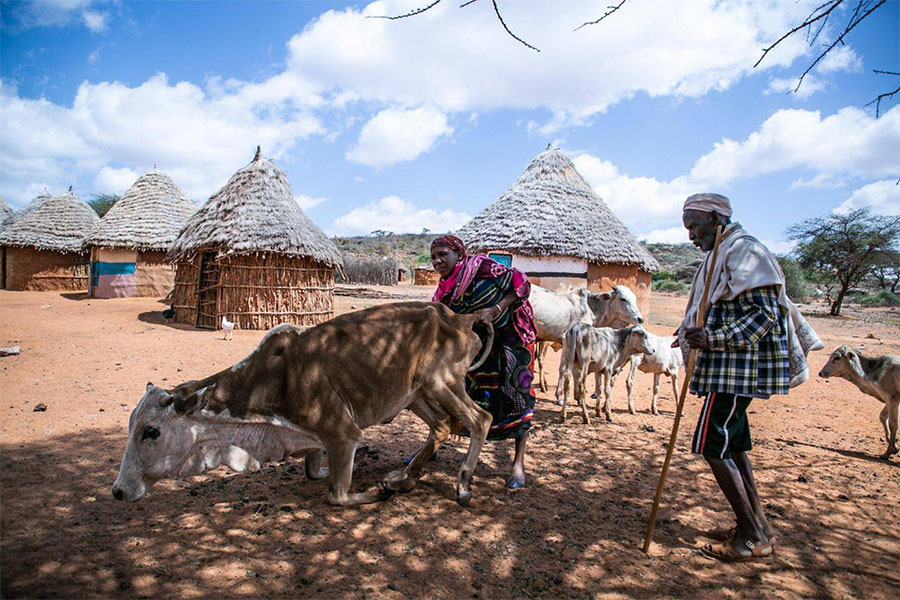
Jan 7 , 2022
By Brook Kebede
The recent conflict, recurring natural disasters, chronic poverty, drought, desert locust swarms, widespread food insecurity and the COVID-19 pandemic have resulted in millions of Ethiopians needing humanitarian assistance. The recent escalation of the civil war has resulted in the loss of life, displacement, and looting of a large segment of the population.
Besides, there are too many destroyed health centres, civilian infrastructure, factories, universities, schools, government offices and irrigation systems vital to the economy. It is no surprise then that millions of people in Ethiopia are in dire need of humanitarian assistance.
Some seven million people throughout the country are suffering acute food insecurity. Still, the humanitarian situation continues to deteriorate. The complex circumstances have made humanitarian response very difficult, and the population's needs continue to increase. Above all, vulnerable sections of society, including children, persons with disabilities, women, seniors, and others, have been affected by the humanitarian crisis and will also likely continue to be impacted after the conflict ends.
There is a strong need to expand the financing pool for protracted humanitarian crises and reconstitution of basic infrastructure. Here, we have observed several efforts made by individuals, groups, NGOs and government agencies. Besides, the public is providing a helping hand through various means. But there is a lack of coordination since humanitarian actors and government are making independent decisions and choices about who, what and where to provide support.
There is also no regular forum for consultation or communication about these choices and decisions. Consequently, duplication of tasks and wastage of resources are observed. There is a strong need for coordinated effort about the division of tasks, or at the very least, and greater communication of funding intentions between them. This is because coordinated humanitarian services can bring significant benefits and will help to save more lives and restore more people’s livelihoods.
Comprehensive post-conflict reconstruction plans need to be designed to facilitate the transition to sustainable peace and to support economic and social development. Economic recovery depends on the success of this transition and on rebuilding the domestic economy and restoring access to external resources. The government should design a comprehensive reestablishment framework of governance by strengthening affected regional and local governments, restoring law and order, and enabling civil society organisations to work effectively in the affected areas.
Besides, both the federal and regional governments need to focus on revamping essential infrastructures, such as key transport, communication, and utility networks. In this respect, they should rebuild and maintain key social infrastructure, financing education and health, including recurrent costs.
There has to be a clear and smart plan to provide assistance to those affected by conflicts through the reintegration of displaced populations. In the meantime, it is vital to demobilise and reintegrate ex-combatants, including militias and irregular armed groups. Special considerations should also be given to the wounded and impacted populations. The whole time, attention should not be taken away from vulnerable groups, such as women, persons with disabilities, seniors and children. It is the long-term effects of war on these groups that will continue to burden the economy even after the conflict is officially ended.
The federal government, in consultation with regional governments, should also design a strategy that promotes investment in key productive sectors; creates conducive conditions for resumption of trade, savings, and domestic and foreign investment; and promotes macroeconomic stabilisation, rehabilitation of financial institutions, and restoration of appropriate legal and regulatory frameworks. To aid in this, the government needs to normalise financial borrowing arrangements by planning a workout of arrears, debt rescheduling, and the longer-term path to financial normalisation.
PUBLISHED ON
Jan 07,2022 [ VOL
22 , NO
1132]


Radar | Apr 10,2021

Radar | Nov 16,2024

Editorial | Jun 24,2023

Viewpoints | Feb 26,2022

Radar | Oct 17,2020

Agenda | Jan 29,2022

Radar | Feb 19,2022

Radar | Jul 08,2023

My Opinion | May 13,2023

Radar | Jan 15,2022

Photo Gallery | 174164 Views | May 06,2019

Photo Gallery | 164389 Views | Apr 26,2019

Photo Gallery | 154523 Views | Oct 06,2021

My Opinion | 136646 Views | Aug 14,2021
Editorial | Oct 11,2025

Dec 22 , 2024 . By TIZITA SHEWAFERAW
Charged with transforming colossal state-owned enterprises into modern and competitiv...

Aug 18 , 2024 . By AKSAH ITALO
Although predictable Yonas Zerihun's job in the ride-hailing service is not immune to...

Jul 28 , 2024 . By TIZITA SHEWAFERAW
Unhabitual, perhaps too many, Samuel Gebreyohannes, 38, used to occasionally enjoy a couple of beers at breakfast. However, he recently swit...

Jul 13 , 2024 . By AKSAH ITALO
Investors who rely on tractors, trucks, and field vehicles for commuting, transporting commodities, and f...

Oct 11 , 2025
Ladislas Farago, a roving Associated Press (AP) correspondent, arrived in Ethiopia in...

Oct 4 , 2025
Eyob Tekalegn (PhD) had been in the Governor's chair for only weeks when, on Septembe...

Sep 27 , 2025
Four years into an experiment with “shock therapy” in education, the national moo...

Sep 20 , 2025
Getachew Reda's return to the national stage was always going to stir attention. Once...

Oct 12 , 2025
Tomato prices in Addis Abeba have surged to unprecedented levels, with retail stands charging between 85 Br and 140 Br a kilo, nearly triple...

Oct 12 , 2025 . By BEZAWIT HULUAGER
A sweeping change in the vehicle licensing system has tilted the scales in favour of electric vehicle (EV...

Oct 12 , 2025 . By NAHOM AYELE
A simmering dispute between the legal profession and the federal government is nearing a breaking point,...

Oct 12 , 2025 . By NAHOM AYELE
A violent storm that ripped through the flower belt of Bishoftu (Debreziet), 45Km east of the capital, in...